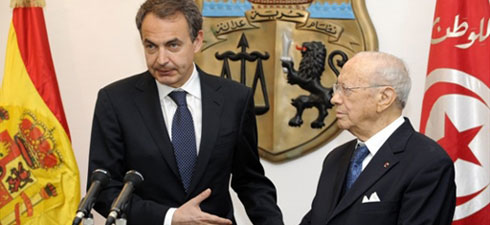On Wednesday 2 March, the leader of the Spanish government demonstrated Spanish and European solidarity with the democracy movement that has taken hold of the Arab world. He did so without grandstanding, and said what needed to be said: "We are here to listen and to help build a future of democracy, freedom and dignity." There was nothing naive or sanctimonious in his remarks, nor were they interfering: these were the right words and the right tone.
Europe should thank Mr Zapatero for stepping in to fill what was effectively a vacuum. It is easy to see why France, which had welcomed "progress towards freedom" under Ben Ali, could not be the first country to cross the Mediterranean to celebrate a new era of liberty.
And although it is true that the leader of Europe’s diplomatic service, Catherine Ashton, did travel to Tunis in mid-February, her intervention did not succeed in dispelling a sentiment that Europe was struggling to respond to a historic change on its southern border, which it urgently needed to address.
The shared destiny of Europe and its near neighbours
That said, the European Union was not wrong to be preoccupied with the issue of a potentially massive increase in the number of refugees arriving on its shores. This has to be a priority for countries like Spain, Italy and France — especially in view of the budgetary austerity that prevails in most of Europe’s member states. In such circumstances, can anyone successfully argue that now is the right time to welcome thousands of migrants?
Mr Zapatero announced 300 million euros of aid to Tunisia in the form of a credit line from the European Investment Bank (EIB), and to help Arab countries seeking to implement democratic reforms, he is proposing to involve the private sector. Like the French President, he advocates revitalising the Union for the Mediterranean (UfM) — a programme to build bridges between Europe and North Africa, launched by Nicolas Sarkozy in July 2008, which has never really taken off. Now the good news is that France’s new Foreign Minister Alain Juppé, who is expected to visit Cairo later this week, also favours this approach.
Of course all of these developments are positive, but the question is: do they go far enough? Europe will have to show political solidarity on a greater scale that is commensurate with the importance of events. What is needed is a gesture that emphasises the shared destiny of Europe and its near neighbours on the other side of the Mediterranean. We need to see an EU that is faithful to its values, which is not indifferent to the nature of surrounding regimes. This is not a matter of preaching or choosing to ignore certain countries. But Europe’s external relations should be characterised by a "most favoured nation" clause that prioritises ties with states that demonstrate full respect for human rights.
Translated from the French by Mark McGovern
Do you like our work?
Help multilingual European journalism to thrive, without ads or paywalls. Your one-off or regular support will keep our newsroom independent. Thank you!
















